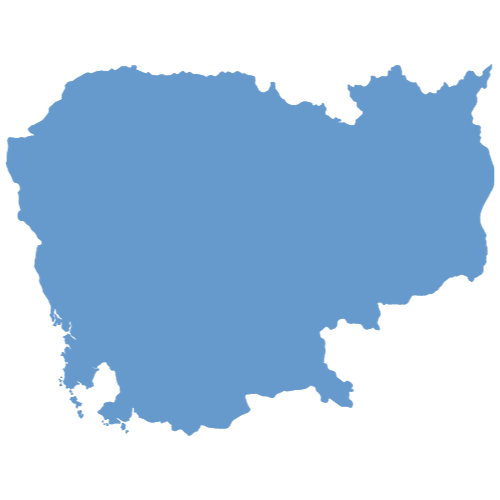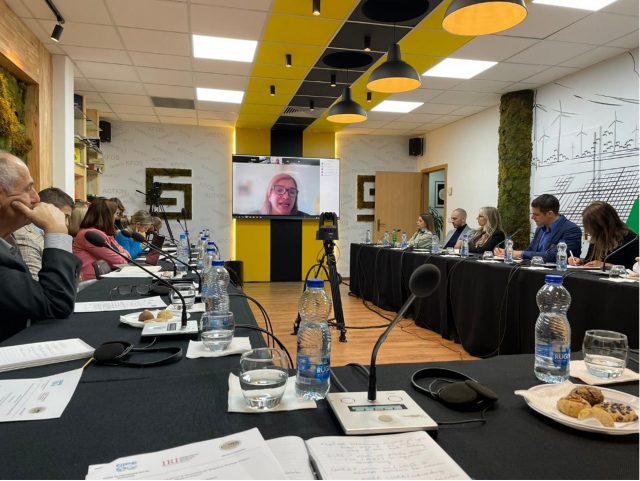To succeed in today’s economy, many business owners and entrepreneurs need and want to be able to move their businesses online safely. From September 2022 to June 2023, CIPE’s Center for Women’s Economic Empowerment (CWEE) commissioned surveys of women business owners and entrepreneurs in Cambodia, Colombia, and Kosovo to better understand their experiences of digital transformation. Additionally, CIPE hoped to understand respondents’ experiences and opinions surrounding the topic of technology-facilitated gender-based violence and harassment (TFGBVH), as well as their ideas for what the business and political communities should do to address TFGBVH in the local context.
The UN defines TFGBVH as “any act that is committed, assisted, aggravated or amplified by the use of information communication technologies or other digital tools which results in or is likely to result in physical, sexual, psychological, social, political or economic harm or other infringements of rights and freedoms.” Like other forms of gender-based violence, TFGBVH is “directed against women because they are women and/or…affect women disproportionately.” TFGBVH is a human-rights violation and is part of the wider continuum of gender-based violence, with “negative effects on the health and wellbeing of women and girls as well as serious economic, social and political impacts.”¹ Consequently, addressing TFGBVH is key to ensuring women’s ability to participate equitably in the digital realm, especially due to the importance of digital tools for women in business.
CIPE’s surveying revealed that digital resources like websites, social media, and communications tools are important to women entrepreneurs, employees, and business owners, especially since the COVID-19 pandemic. However, 291 of 698 survey respondents, or 42%, had experienced TFGBVH. Many respondents noted the importance of addressing TFGBVH to women’s economic empowerment and made suggestions on steps women business associations and women political leaders can take to mitigate and respond to the challenges presented by TFGBVH.
KOSOVO
 Women business owners in Kosovo emphasized the importance of online business operations, as more than one third of respondents were forced to move some or all of their business online due to the COVID-19 pandemic. By September 2022, almost 90% of surveyed businesses had an online presence, such as social media accounts or a website.
Women business owners in Kosovo emphasized the importance of online business operations, as more than one third of respondents were forced to move some or all of their business online due to the COVID-19 pandemic. By September 2022, almost 90% of surveyed businesses had an online presence, such as social media accounts or a website.
Like in other surveyed countries, TFGBVH represents a significant barrier to women’s economic empowerment in Kosovo. More than three-quarters of respondents believe that TFGBVH is a challenge to women in business. Additionally, 12.9% of respondents had personally experienced TFGBVH while running their business online, most often through Facebook or Instagram. Just over 10% of respondents changed the way they do business due to fear of harassment.
Most surveyed women in Kosovo consider TFGBVH to be a problem, and more than three-quarters of respondents believed that politicians and the private sector should do more to address TFGBVH. Additionally, the survey showed that 50% of respondents have participated in conversations, dialogue, or roundtables about the challenge of TFGBVH or gender-based violence and harassment (GBVH) at the workplace with other women in business. However, only 14.7% of respondents know of existing processes, practical steps, initiatives, resources, or tools to protect women in business from harassment. When asked what business associations should do to respond to TFGBVH and GBVH in the workplace, respondents suggested trainings (27.5%); media campaigns (23.9%); advocacy (12.4%); and providing access to resources and materials (12.4%).
CAMBODIA
 Cambodian women business owners and entrepreneurs are of particular focus because of the impact that they have in driving economic growth when they are empowered for success. CIPE supported a research project in Cambodia to survey Cambodian women business owners and entrepreneurs to understand their experiences and thoughts about the topic of TFGBVH. Facebook was the most common online tool used by surveyed businesses: 97% of respondents used Facebook as their primary social media platform, while 56% primarily used Instagram. Notably, about a quarter of participants have a website for their business, even though websites are only recently increasing in popularity in the country.
Cambodian women business owners and entrepreneurs are of particular focus because of the impact that they have in driving economic growth when they are empowered for success. CIPE supported a research project in Cambodia to survey Cambodian women business owners and entrepreneurs to understand their experiences and thoughts about the topic of TFGBVH. Facebook was the most common online tool used by surveyed businesses: 97% of respondents used Facebook as their primary social media platform, while 56% primarily used Instagram. Notably, about a quarter of participants have a website for their business, even though websites are only recently increasing in popularity in the country.
At the same time, around a quarter of respondents had experienced TFGBVH, while more than half of respondents had heard of their family and friends experiencing it. In both cases, online abuse overwhelmingly took place on Facebook. Survey respondents reported many forms of TFGBVH, including hate and discriminatory speech (the most common); bullying, harassment, or posting inflammatory comments; and sharing personal information or photos without consent. Most respondents addressed the online abuse by blocking aggressors or removing content from their social media accounts.
TFGBVH is a significant challenge to women-owned business, according to more than 80% of respondents. For instance, 8% of respondents moved their business operations offline due to a fear of online abuse. However, only half of respondents were familiar with the term “online abuse,” indicating the lack of relevant language and discussion around the issue.
In terms of preventing and addressing TFGBVH, respondents most often suggested that government and business associations provide an online abuse hotline. Respondents also expressed a demand for online and offline media campaigns, online training, public discussions/workshops, and online resources and materials.
Despite the survey’s result condemning TFGBVH, it is worth noting that approximately 25,000 people opened the survey but chose not to answer any questions, compared to only 108 qualified respondents who completed the survey. The high interest yet low response rate may suggest a widespread reluctance to discuss TFGBVH, indicating that it remains a sensitive issue.
COLOMBIA
 Digital tools are essential to women in business in Colombia. For instance, survey respondents use the Internet extensively: 68.3% of the surveyed women who are entrepreneurs and/or workers use the Internet for work for at least seven hours per day. Unlike in Cambodia, Facebook was not the most popular online tool. Instead, most surveyed women entrepreneurs and workers used WhatsApp (83%) for business purposes, followed by email (68%), Instagram (34%), video call platforms like Skype, Zoom, or Teams (31%), and Facebook (28%).
Digital tools are essential to women in business in Colombia. For instance, survey respondents use the Internet extensively: 68.3% of the surveyed women who are entrepreneurs and/or workers use the Internet for work for at least seven hours per day. Unlike in Cambodia, Facebook was not the most popular online tool. Instead, most surveyed women entrepreneurs and workers used WhatsApp (83%) for business purposes, followed by email (68%), Instagram (34%), video call platforms like Skype, Zoom, or Teams (31%), and Facebook (28%).
More than half (53%) of the surveyed women reported having experienced some form of TFGBVH. This high rate is especially notable when compared to UN estimates stating that 23% of women in Europe have experienced TFGBVH.² The respondents had experienced forms of TFGBVH such as harassment, online threats, and sending images with offensive or sexually explicit content without their consent, among others. The main platforms or social media used for online violence were WhatsApp (39.7%), Facebook (35.5%), and Instagram (30.7%). Victims most frequently reacted by blocking the aggressor (77.9%), followed by reporting the behavior to the platform or social network (24.1%), and talking to colleagues, partners, or supervisors (12.4%).
Regarding attitudes towards TFGBVH on social media, a majority of respondents (85.6%) disagree or strongly disagree that it is normal to harass women who post provocative or flirty photos on social media. However, a significant percentage (14.4%) still consider this type of harassment to be justified. These harmful attitudes reinforce victim-blaming and the normalization of TFGBVH. To address such biases, it is crucial to work on eliminating stereotypes and prejudices that perpetuate gender inequalities. Similarly, the majority of the participants (91.2%) disagree with the idea that it is normal for coworkers or bosses to give them compliments or flirt with them in the workplace, though a small percentage (8.7%) agree or strongly agree with this belief. Finally, 72.1% of the respondents do not agree with the statement that it is more difficult for men than for women to control their sexual instincts; yet more than a quarter of respondents (27.9%) still agree or strongly agree with this statement.
In other words, a small minority of respondents still justify inappropriate behaviors in the workplace, highlighting the need to promote a culture of respect and equity and raise awareness about appropriate conduct. Misconceptions around men’s ability to control themselves and women’s roles in society reinforce gender stereotypes and justify many types of harassment and sexual violence. To combat these attitudes, it is important to promote education based on gender equality and shared responsibility in respecting boundaries and consent in relationships.
Conclusion

The survey data indicates the importance of accessing online spaces for women in business, as well as the challenges of TFGBVH. The need for gender equality extends to the online world, especially as the digital space becomes even more important to women entrepreneurs, business owners, and workers. To address the issue of widespread TFGBVH, recommendations to address how and where it surfaces include launching educational programs on TFGBVH; campaigns to promote respect and empathy and prevent harassment on social media; education in schools and the workplace on consent and gender equality; and the protection of privacy and digital rights.
In the workplace, implementing preventive measures to build digital work environments free of TFGBVH offers numerous advantages and benefits for companies. These measures include establishing zero-tolerance policies towards online violence, training employees and executives on responsible technology use, creating safe and respectful environments, protecting personal data privacy, enabling confidential reporting channels, monitoring proper use of social media, responding promptly to reports, and collaborating with specialized organizations.
Creating virtual spaces where respect, gender equality, and security prevail strengthens employees’ emotional and physical well-being, fosters trust and loyalty towards the company, and reduces the risk of conflicts and litigations. Additionally, taking steps to prevent TFGBVH helps promote an inclusive, empowering, and more productive work culture. These measures also demonstrate a company’s commitment to gender justice and social responsibility, contributing to a positive image for customers, partners, and current and potential employees.
CWEE’s mission is to empower women to overcome economic inequality and lead entrepreneurial ventures, government engagement, and advocacy. By promoting women’s leadership, CWEE strengthens community and global networks of women to advocate for democratic reforms, facilitating more resilient and inclusive economies. To ensure a holistic approach, CWEE focuses programming at three levels: personal empowerment; community building; and institutional reform.
Furthermore, CIPE’s newly established Center for Digital Economy and Governance (CDEG) will foster inclusive and rights-based digital transformation so that democracy can deliver for all citizens in the digital age. This work includes supporting an inclusive and enabling digital economy policy environment for women business owners and entrepreneurs while also promoting a safer digital space, including combatting TFGBVH and protecting digital rights. CDEG plans to offer digital resources to partner organizations across the globe, including the “The Digital Economy Enabling Environment Guide” and “Harnessing the Power of the Digital Economy,” a guide for micro, small, and medium enterprises to transition their businesses online. To combat TFGBVH, CDEG will partner with women’s business associations and other civil society organizations to raise awareness, build digital literacy and security skills, identify successful protections for women in business, and advocate for national and regional policy reforms.
Analysis of the research conducted in Colombia led to the identification of steps workplaces can take to prevent and respond to TFGBV. Some of the actions that companies can take include:
-
Establish zero-tolerance policies towards online violence;
-
Train employees and executives on responsible technology use;
-
Create safe and respectful environments;
-
Protect personal data privacy;
-
Enable confidential reporting channels;
-
Monitor proper use of social media;
-
Respond promptly to reports; and
-
Collaborate with specialized organizations.
Methodology and Samples
In Kosovo, surveying was conducted by phone in September 2022. Samples represent 120 businesses, with a 7% margin of error and 90% confidence level. In Cambodia, online surveys targeted women who own a business, co-own a business with at least 50% ownership or decision-making, and women who are entrepreneurs. A total of 108 respondents qualified for the survey and completed all of the questions. Data was collected in February 2023.
In Colombia, the survey was conducted both online and via phone and focused on businesswomen and female employees who work online for more than four hours daily in Colombia and are employed in companies registered in the chambers of commerce in the cities of Bogotá, Medellín, and Cali. Together, these three cities contain more than half of all the companies registered in Colombia, representing their importance to the country’s economy. The total sample size was 470, the margin of error was 4.52%, and a confidence level of 0.95 was established for the obtained results. Data was collected in June 2023.
²https://www.ohchr.org/EN/HRBodies/HRC/RegularSessions/Session38/Documents/A_HRC_38_47_EN.docx
Published Date: November 08, 2023
